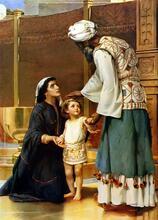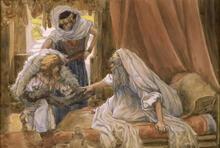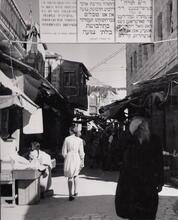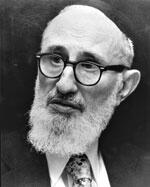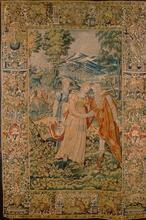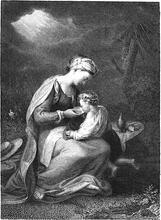Barren Women in the Bible
There are six barren women in the Bible: three of the four matriarchs (Sarah, Rebekah and Rachel) in Genesis; Hannah, mother of the prophet Samuel (1 Samuel 1-2); the anonymous wife of Manoah, mother of Samson (Judges 13); and the “great woman of Shunem,” also called the Shunammite, an acolyte of the prophet Elisha (2 Kings 4:8-44). In some cases, the presence of a fertile, though less beloved, co-wife exacerbates the barren woman’s distress. In each of the stories, the son is ultimately dedicated back to God—in service or even in sacrifice. The paradigm of the Barren Woman in the Hebrew Bible supports the Rabbinic adage that God holds the keys to birth and death (M. Taanit 3:8)—what God gives, God may take back.
There are six stories of barren women in the Hebrew Bible: three of the four matriarchs, Sarah (Genesis 11:30), Rebekah (25:21), and Rachel (29:31); Hannah, mother of the prophet Samuel (1 Samuel 1-2); the anonymous wife of Manoah, mother of Samson (Judges 13); and the “great woman of Shunem,” also called the Shunammite, an acolyte of the prophet Elisha (2 Kings 4:8-44). One might also include “Daughter Zion [Bat Tzion],” where Second Isaiah personifies Jerusalem as a “barren woman, who has borne no child…who has never been in labor…” (Isaiah 54:1; see Pesikta deRab Kahana 18:3). Just as central female figures in the Bible were deemed barren and then granted progeny through divine intervention, Daughter Zion (Jerusalem) would once again be blessed with children following the return from exile (circa 5th-4th c. BCE). Why were so many prominent women in the Hebrew Bible barren? Further, what does the “barren woman” as a literary paradigm tell us about the relationship between God and God’s chosen people?
Roots of Barrenness
In agrarian societies during the biblical period (1200-600 BCE), bearing children was highly valued and women’s primary role was that of mother. Birthing and raising children, however, were fraught, given the high rate of maternal death in childbirth and of infant mortality; only half of all children born survived to the age of five. In the biblical stories of barren women, maternity is further complicated in order to heighten the drama of the arrival of the promised son, emphasizing the divine role in conception and birth. In the case of the patriarchal stories in Genesis, the matriarchs’ barrenness emphasizes that it is God who disrupts continuity, in the transition from one generation to the next, and then selects the true heir to the covenant.
In the Bible and until quite recently, the problem of infertility was attributed physiologically to women, though ultimately it was God who was seen as holding the keys to opening and closing the womb (Mishnah Taanit 3:8). Only female figures are identified by the descriptor “barren [‘aqarah]” (Genesis 11:30, 25:21, 29:31; Judges 13:2, 3; 1 Samuel 2:5; Psalms 113:9; Job 24:21), derived from the Hebrew root ‘qr, meaning “to uproot or pluck up,” the opposite of “to plant” [nt‘] (Ecclesiastes 3:2). A woman’s infertility might also be marked by the phrase “she had no progeny” (as in Genesis 11:30, Judges 13:2, 2 Kings 4:14). Often these biblical women suffered deep shame as a consequence, their barrenness attributed to some hidden wrong, sin, or flaw. Sarai confronts Abram, when she is slighted in Hagar’s eyes: “May the wrong done to me be on you!” (Genesis 16:5). When Rachel pleads with Jacob, “Give me children or else I die” (30:1), her husband answers: “Am I in the place of God who has withheld from you the fruit of the womb?” (v. 2); when the matriarch finally conceives, she names her son Joseph [Yosef], “for God has taken away my reproach” (v. 23). Peninah, mother of Elkanah’s children, made Hannah miserable, taunting her because “God had closed her womb” (1 Samuel 1:6).
Overcoming Barrenness
In a polygynous society, the barren woman was often compelled to share her husband with a more fertile rival (though often less beloved) wife. In some cases, this was at the initiative of the barren woman herself, who would use her handmaid to bear children for her in a kind of proto-surrogacy: Sarai uses Hagar (Genesis 16), Rachel uses Bilhah (30:3-8), and Leah uses Zilpah (30:10-13). Other strategies include the use of herbal concoctions, as in Rachel’s use of mandrakes (31:14-16), or of intercessory prayer: Isaac prays for Rebekah (25:21); Abraham prays for the women in Abimelech’s household (20:17-18); and Hannah prays for herself and utters a vow that, if she were to give birth to a son, she would dedicate him as a Nazirite to the service of God (1 Samuel 1:11). In the story of the wife of Manoah, the angel designates the promised son, Samson, as a Nazirite from the womb (Judges 13:4-5).
In many of the narratives, the barren woman is promised the much-desired son by an angel of God or an emissary in an “Annunciation Scene” that heralds the birth of the beloved son. While Sarah is sequestered in her tent, three men/angels appear to Abraham to announce the birth of a son to them in their old age (Genesis 18:10, 14). Similarly, Rebekah is privy to an oracle about the destiny of her twins, Jacob and Esau, who become the progenitors for the nations Israel and Edom (25:21-23); God hears Rachel and remembers her (30:22); the wife of Manoah is promised a child who will save the Israelites from the Philistines (Judges 13:3-5); Eli, the priest, promises Hannah that she will be granted what she asked for (1 Samuel 1:17); and the Shunammite is promised a child, though she never asked for one (2 Kings. 4:13, 16). The resolution to the woman’s barrenness is often marked by the phrase: “And God remembered/took note of [pqd/zkhr] Sarah” (or Rachel or Hannah) (Genesis 21:1, 30:22, 1 Sam. 2:21). Sometimes the power of closing and opening the womb is attributed to the divine, even for the fertile woman (Genesis 30:17). In the psalms of praise, God is the source of fertility and conception (Psalms 113:9, 1 Samuel 2:5).
Progeny of Barren Women
The motif of barrenness highlights the unique destiny of the promised son. As Susan Ackerman has pointed out, in each of these stories the life of the life of the son is somehow threatened and/or dedicated to God. Isaac, for example, is bound on the altar (Genesis 22:10-12), while Jacob flees for his life from his murderous brother and wrestles with a divine being upon his return, before facing Esau again (27:41, 32:23-25). Joseph is nearly killed by his brothers and sold into slavery (37:18-24, 28); Samson is dedicated as a Nazirite to God, which gives him the strength (through his uncut hair) to wage a one-man battle against the Philistines, ultimately dying a martyr’s death in the Temple of Dagon (Judges 13:5, 16:17, 30); Samuel is given over, as a young boy, to divine service in the sanctuary at Shiloh (1 Samuel 1:27-28); and the Shunammite’s son actually dies but is brought back to life by Elisha (2 Kings 4:32-35). These narratives suggest that God, who opens the womb, has the right to demand the life that emerges from it.
Ackerman, Susan. “Child Sacrifice: Retuning God’s Gift.” Bible Review 9:3 (June 1993): 20-29, 56.
Alter, Robert. “How Convention Helps Us Read: The Case of Bible’s Annunciation Type Scenes.” Prooftexts, 3 (1983): 115–130.
Baskin, Judith. “Rabbinic Reflections on the Barren Wife.” Harvard Theological Review 82 (1989): 1–14.
Callaway, Mary. “Sing, O Barren One”: A Study in Comparative Midrash. Atlanta: Scholars Press, 1986.
Fuchs, Esther. “The Literary Characterization of Mothers and Sexual Politics in the Hebrew Bible.” Semeia 46 (1989): 151-166.
Levenson, Jon. The Death and Resurrection of the Beloved Son. New Haven and London: Yale University Press, 1993.
Meyers, Carol. Rediscovering Eve: Ancient Israelite Women in Context. New York: Oxford University Press, 2013.
Moss, Candida R. and Joel S. Baden. Reconceiving Infertility—Biblical Perspectives on Procreation & Childlessness. Princeton and Oxford: Princeton University Press, 2015.
Steinberg, Naomi. “The Genealogical Framework of the Family Stories in Genesis.” Semeia 46 (1989): 41-50.


